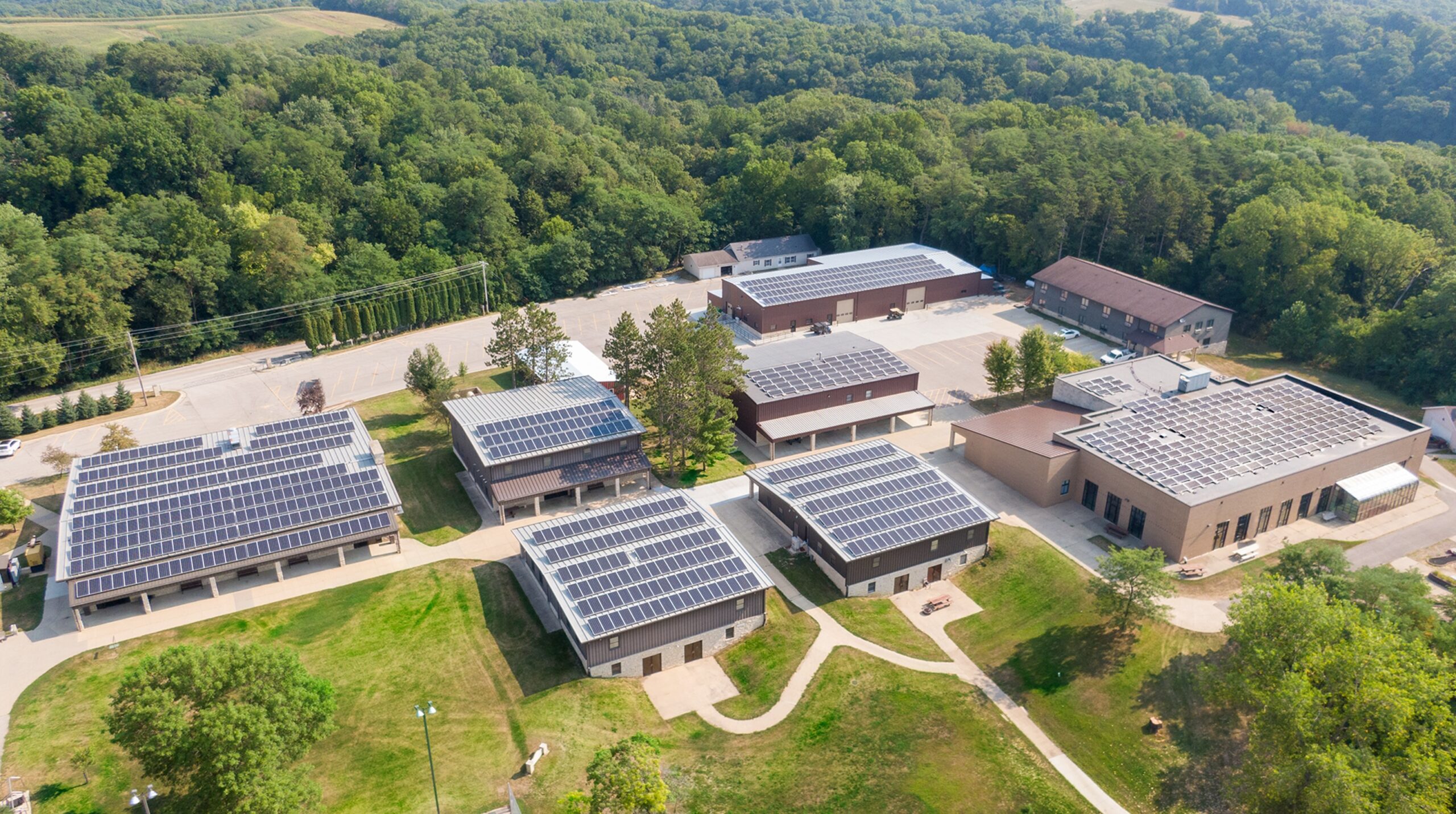Camp Courageous Takes Major Steps To Be Good Stewards Of The Environment

Since the inception of Camp Courageous in 1972, the Camp has taken steps to be good environmental stewards. Camp makes every effort to minimize the footprint of its 100,000 annual visitors and campers. Wanting to be a leader, Camp realizes good environmental stewardship means having the ability to change quickly to an ever-changing environment today, tomorrow, and into the future.
Source Water Protection
The Iowa Department of Natural Resources (IDNR) defines source water as the source of drinking water in its natural environment, whether it’s surface water like rivers and lakes, or ground water in an aquifer, before its extracted, treated and distributed by a water system. The Source Water Protection Program is an initiative aimed at safeguarding the quality of drinking water for years to come.
Camp Courageous, with the guidance of IDNR Source Water Protection Coordinator, Matt Dvorak, has completed a multi-year Source Water Protection Plan. Camp Courageous, prides themselves on being innovators, and the Source Water Protection Plan is a key part of their commitment to environmental stewardship.
The goal of the program is to prevent contaminants from entering public water sources by managing the land and the activities that occur on it, to protect the source water. In doing so, Camp Courageous enhances water quality and ensures better protection of this vital resource. Matt Dvorak said, “I have really enjoyed working with Camp Courageous during this process. They are a first-class organization, and I have been impressed with their dedication to conservation and sustainability during the development of their plan.”
Water Quality
- All active wells on Camp Courageous’ property are monitored by daily water testing. This ensures that Government Standards of contaminants are within an acceptable range. These results are then verified by a third-party source, ChemRight Laboratories in Maquoketa, Iowa. They provide Camp with a back-up copy and forward the results to the IDNR in Des Moines. ChemRight Laboratories have been providing Camp Courageous these services for free, for years. Testing is particularly zeroing in on nitrates and coliform.
- Active Camp wells were inspected and scoped in the Spring of 2024 for liner cracks that could allow contaminates to seep into a well. All wells passed inspection, with no concerns. This process will be repeated every 5 years, as recommended by IDNR.
- All Camp well heads have a protective concrete barrier ring installed in 2024 to better identify the exposed well heads.
- All in-active wells at Camp have been capped, in accordance with the IDNR, and are no longer in use.
Wastewater
The IDNR defines wastewater as a liquid and waterborne waste that results from human activities.
Camp has a Wastewater Treatment Plant located on the main Campus. This system allows wastewater to be treated on site and sanitized before being released into the environment in accordance with the IDNR standards.
Actions:
- The Wastewater Treatment Plant has state of the art equipment, including an ultra-violet disinfectant system.
- The entire system is tested monthly and permitted every five-years by the National Pollutant Discharge Elimination System. In addition, at any time there are improvements made to the system, it is coordinated with the IDNR.
- Any additional septic plans for Camp Courageous will require pretreatment tanks, that are approved by the IDNR. These pre-treatment tanks will be pumped as needed, with solids being disposed of by approved methods, in accordance with IDNR standards and liquids will be transported to the Camp’s Wastewater Treatment Plant for processing.
- Camp has removed all pit toilets, and replaced them with self-contained units, that are strategically located throughout camp. A pumping system was purchased in 2024, which enables waste to be transferred to Camp’s Wastewater Treatment Plant for processing.
Soil Erosion and Nitrate Reduction
Soil Erosion is defined as the accelerated removal of topsoil from land surface through water, wind, and tillage.
Excessive nitrate levels can leach into the groundwater, contaminating drinking water source and posing health risks. It also allows excessive plant growth in waterways that promotes algae and other negative aquatic life.
Actions:
- Camp has taken steps at protecting topsoil erosion by providing ground cover in any disturbed area and assuring run off areas are provided with filtered drainage into rock and prairie grasses to help capture erosion and nitrate run off.
- Camp has entered a Tree Planting Plan with the Monarch Research Project (MRP) to continue its biodiversity by strategically planting trees, throughout the campus. This project not only aids with soil erosion, but helps to filter nitrates, improves air quality, and increase the biodiversity for wildlife and bird habitat.
- Most the farmland surrounding Camp Courageous flows into the Maquoketa River, is farmed by an individual who was recently selected to join the Iowa Environmental Protection Commission. This individual does state-of-the-art farming practices, including no till that will promote a healthy farming environment for future generations. In 2024 an agreement was signed with the Jones County Farm Service Agency to plant cover crops on this farmland, another step to add organic matter, reduce erosion, and enhance water infiltration.
Light Pollution
Light Pollution is defined as an excess of inappropriate use of artificial light.
Actions:
- Camp is creating noise and light buffers around the camp by introducing several different species of trees into its landscape. In time they will serve to reduce light and sound.
- Camp has utilized the world class experts, MUSCO Sports Lighting, to provide their state-of-the-art products, that insures direct lighting without excess light pollutants.
Noise Pollution
Noise pollution is a disturbing sound that negatively impacts the well-being of other humans.
Actions:
- Camp in concurrence with the Iowa Department of Transportation has reduced the speed limits to ensure excessive vehicle noise is restricted, as well as the safety of its campers, staff, and visitors while crossing the major thoroughfare.
- Camp is in the process of obtaining electric vehicles when needed to transport campers or visitors throughout the campus. This not only assist in decreasing noise pollution but is a contributor to cleaner air quality.
Energy Reduction
Energy reduction is defined as a method used in decreasing energy usage.
Action:
- Camp Courageous has been a leader in the use of solar power for years. The Camp’s huge solar project, provided by its generous supporters, has generated a huge cost saving to camp (has saved Camp over $100,000/year).
- Camp has installed numerous timers, thermostats, etc. for energy efficiencies.
- Camp has LED lighting as a norm for all buildings and recreational areas to aid in energy efficiency.
Environmental Impact on Landfills
Landfills generate methane and potential greenhouse gas, contributing to climate change and contaminating leachate into groundwater. Leachate is the process when rainwater filters through waste in landfills.
Actions:
- Camp Courageous has a recycling area located on the main campus, where items are sorted and then distributed to the proper disposal or recycling facility.
- Camp Courageous’ Manchester Garage Sale is a hub for re-purposing items. This is accomplished primarily through sales, which directly benefits Camp. Items that are not sold are often donated to organizations that repurpose furniture, for lower income housing. A volunteer couple made the comment, “Our sole purpose for volunteering here, at the Manchester Garage Sale, is to significantly reduce the items going into the landfills.”
- Camp encourages campers to use a refillable water bottle for their drinking needs. This practice reduces the number of disposable containers.
Camp’s Actions:
As a result of the above policies and plans, Camp Courageous recognized the need to have an Environmental Green Team Lead. This person will not only oversee the above programs but ensure growth in all areas for the future. Camp Courageous has recently identified Jeff Martens as its new Green Team Lead. Jeff has a degree in Biology, has worked for the IDNR and has previous experience in water testing, quality, and environmental stewardship.
Conclusion:
Camp Courageous is fortunate to be surrounded by thousands of acres of State primitive land and the Maquoketa River. Camp Courageous has adopted these policies and practices to help ensure a safer, cleaner environment for the future. The safety of tomorrow’s campers and visitors has always been, first and foremost in the minds of the board, and staff at Camp Courageous. Sustainability and new practices are the hope for the future, and the way to become better environmental stewards.



